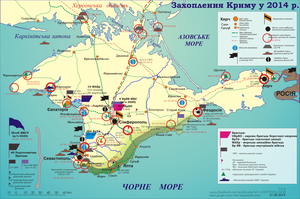User:Пан Хаунд/2014 Russian invasion into Crimea/sandbox
In February and March 2014, Russia invaded the Crimean Peninsula, part of Ukraine, and then annexed it. This took place in the relative power vacuum[1] immediately following the Revolution of Dignity and was the first act of the wider Russo-Ukrainian War.

Background
[edit | edit source]History
[edit | edit source]The events in Kyiv that ousted Ukrainian president Viktor Yanukovych on 22 February 2014 sparked pro-Russian demonstrations as of 23 February against the incoming Ukrainian government. At the same time Russian president Vladimir Putin discussed Ukrainian events with security service chiefs remarking that "we must start working on returning Crimea to Russia". On 27 February, Russian troops[2] seized strategic sites across Crimea,[3][4] followed by the installation of the pro-Russian Aksyonov government in Crimea, the Crimean status referendum, and the declaration of Crimea's independence on 16 March 2014.[5][6] Although Russia initially claimed their military was not involved in the events,[7] Putin later admitted that troops were deployed to "stand behind Crimea's self-defence forces".[8] Russia formally incorporated Crimea on 18 March 2014.[9][8] Following the annexation,[10] Russia escalated its military presence on the peninsula and made threats to solidify the new status quo on the ground.[11]
International eactions
[edit | edit source]Ukraine and many other countries condemned the annexation and consider it to be a violation of international law and Russian agreements safeguarding the territorial integrity of Ukraine.
References
[edit | edit source]- ↑ Lessons from Russia’s Operations in Crimea and Eastern Ukraine, page 19, published by RAND Corporation in 2017. "Ukraine’s government was in transition following the ouster of Yanukovych. As a result, it did not react to the Russian operation when launched. Russia’s task was made relatively easy by the confusion and chaos that generally follows an uprising, such as what happened in Kyiv. Moscow capitalized on the tensions and uncertainty in Crimea, as well as on the inexperience of Ukraine’s provisional government. Meeting notes of the discussion among Ukrainian leadership reveal a great deal of anxiety, uncertainty, and unwillingness to take action for fear of escalation."
- ↑ Template:Cite news
- ↑ Template:Cite news
- ↑ Template:Cite news
- ↑ Cite error: Invalid
<ref>tag; no text was provided for refs namedWashington Post - ↑ Template:Cite web
- ↑ Template:Cite web
- ↑ 8.0 8.1 Template:Cite news
Template:Cite news - ↑ Template:Cite web
- ↑ Template:Cite web
- ↑ Template:Cite web
